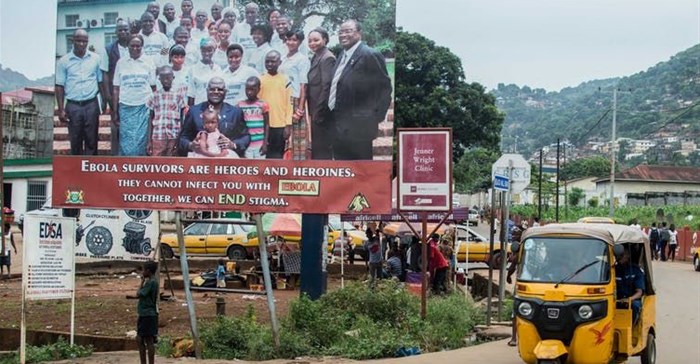Sierra Leone is using lessons from Ebola to prepare for coronavirus

The World Health Organisation has expressed particular concerns about the vulnerability of countries with weak health systems. Resource-poor countries like Sierra Leone have faced major outbreaks of infectious diseases in the past – most notably the 2013-2016 Ebola outbreak in West Africa.
That 2013-2016 Ebola outbreak infected more people and claimed more lives than previous outbreaks of the disease. Like COVID-19, it affected multiple countries and urban settings. Sierra Leone’s eastern region was the first to be affected by Ebola in May 2014. By August 2014 the outbreak had spread to other regions in the country. More than 8,000 probable and confirmed cases and more than 4,000 related deaths occurred in Sierra Leone during the outbreak.
Health officials and scientists dealing with the Ebola outbreak gained valuable experience. For example they gained an appreciation for the role of health education, dissemination of correct information, raising awareness and sensitisation in controlling the spread of the outbreak. These lessons highlighted the gaps in the country’s response and are key to preparing for emerging disease outbreaks.
Learning from Ebola
Before the 2013-2016 Ebola outbreak, public health officials and the general population in Sierra Leone had limited information about the disease and how it’s spread. This made it easy for false information to spread.
With such limited knowledge, a large portion of the general public didn’t know how to prevent, manage or control the disease. Having that experience with Ebola equipped health authorities in Sierra Leone to be proactive. There is little knowledge about COVID-19. Health officials are educating the general public about how it’s transmitted and ways to prevent and control it. They have now embarked on serial community engagements, workshops, radio and TV health programmes designed to make people aware of the COVID-19 outbreak.
National COVID-19 sensitisation activities have been targeting community leaders, local chiefs and health authorities in the border towns and villages along various crossing routes to neighbouring countries. This is because local community leaders and health workers were at the front line to bring the Ebola outbreak in Sierra Leone to an end in 2016.
Like Ebola, COVID-19 is highly infectious, transmittable and communicable. It can easily be contracted by coming into direct contact with infected persons. During the 2013-2016 Ebola outbreak, Sierra Leone implemented a “less touching” policy, which limited the frequency of physical contact between people. There is no scientific report to assess the impact the “less touching policy” had in halting the Ebola outbreak in Sierra Leone. But many believe that it played a major role in reducing the transmission of the disease.
Health officials are applying this policy to preventing this new outbreak. Officials of the Ministry of Health and Sanitation have been canvassing the country preaching the same message of “less touching”.
Perhaps one of the most relevant experiences Sierra Leone obtained from the Ebola outbreak, which is now being used to prevent the outbreak of COVID-19 in the country, is the targeted quarantining of all categories of COVID-19 patients. Targeted quarantining is the process of selecting and subsequently quarantining individuals who are at high risk for an infection without testing the person for that infection.
Because of the challenges of a fragile healthcare system and poorly equipped laboratory, the health authorities in Sierra Leone have been quarantining everyone arriving from China and other Asian countries since December 2019. They are also quarantining for 14 days anyone who arrives at Lungi International Airport with a very high temperature.
People arriving at the Lungi International Airport during the 2013-2016 Ebola outbreak were quarantined only if their body temperature was above 37.2°C (99°F).
Looking ahead
Authorities are confident that Sierra Leone is well prepared to prevent an outbreak of COVID-19. But the country is still faced with major logistical challenges with regard to laboratory diagnostics of certain infectious diseases that are of public health importance. Currently, Sierra Leone doesn’t have the capacity to diagnose for COVID-19 although the country’s lab can diagnose other viral pathogens.
The lack of advanced laboratory diagnostic tools was crucial in the spread of the Ebola outbreak.
Sierra Leone’s major strength in halting the spread of Ebola during the outbreak was massive health education and community involvement in the design of Ebola control and prevention strategies.
This article is republished from The Conversation under a Creative Commons license. Read the original article.![]()
Source: The Conversation Africa

The Conversation Africa is an independent source of news and views from the academic and research community. Its aim is to promote better understanding of current affairs and complex issues, and allow for a better quality of public discourse and conversation.
Go to: https://theconversation.com/africa





